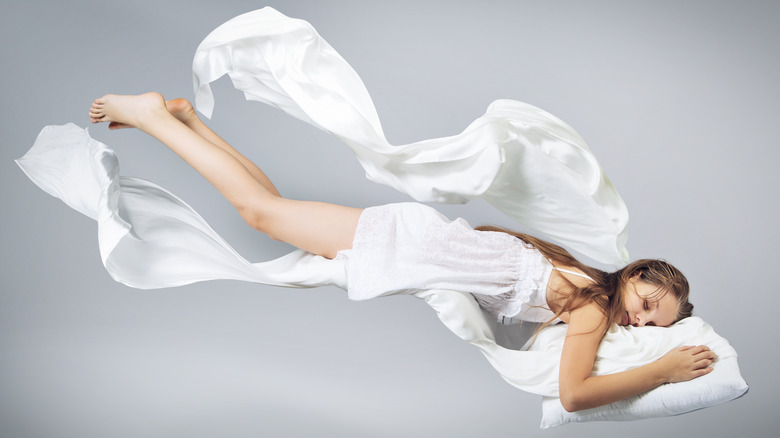Here's What Your Brain Looks Like During Sleep Paralysis
Sleep paralysis can be a frightening occurrence in which your brain wakes up but your body is still asleep. It's a disconcerting feeling when your mind believes you are awake and you can see your dreams as if you are floating outside yourself (via Health). When you try to move, you can't. And you can't help but be relieved a little while later when the episode is over and you are finally completely awake and no longer paralyzed.
What happens in your brain during sleep paralysis looks much like what happens there during the REM cycle of sleep, as that is when sleep paralysis occurs. This is the sleep cycle in which you dream, but something goes haywire.
During REM sleep your brain remains active, which is the reason why dreaming occurs, according to Texas A&M's Vital Record. The off-switch activates in the front portion of your brain, which is what controls our logical thinking, resulting in dreams that can seem a bit out of this world. It's why these stories that play out only when we sleep seem so real (via WebMD). However, during sleep paralysis, REM sleep takes on new heights.
What happens inside your brain to alter REM sleep and induce sleep paralysis
When someone is going through a sleep paralysis episode, there might be a feeling of pressure on the chest, which is caused by the short, rapid breaths you take during REM sleep and the limited muscles, outside of the diaphragm, that are active, as per Verywell Health.
And that feeling of hovering or floating outside your body? That's caused by the disruption of the temporoparietal junction activity in the brain. The temporoparietal junction is what's responsible for humans being able to tell the difference between our own body and our surroundings. During sleep paralysis, you can see an image of your own body, which is what gives you that floating feeling. This can also cause you to think there is an intruder in your room (via EachNight).
Many people report seeing frightening hallucinations during sleep paralysis, but thankfully the episodes only last a few minutes, according to Healthline. "People who experience sleep paralysis can have vivid hallucinations because they are dreaming," Steven Bender, DDS, and clinical assistant professor at Texas A&M, explained to the university's Vital Record. "People have felt like they're levitating or that someone is in their bedroom or a variety of other strange experiences — like alien abductions."
While sleep paralysis can be terrifying, it is not harmful, Bender noted.

